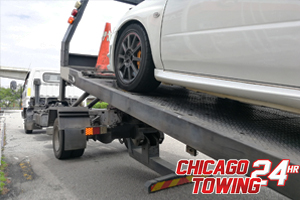In this blog entry, the professional Chicago-area heavy duty towing service team here at Towing Chicago will detail the different ways that vehicle weight distribution can affect vehicle towing.
Vehicle Tongue Weight
Tongue weight describes the down-moving force applied by the vehicle’s trailer or the towed vehicle onto a vehicle’s hitch. With most vehicles, the best tongue weight is between ten and fifteen percent of the total weight of the loaded trailer. Too small tongue weight can make the trailer sway, and too much tongue weight can overload the rear of the towing vehicle. It’s essential to carefully manage tongue weight when keeping control, safety, and stability while towing.
How can weight distribution affect braking during towing?
It is essential for weight to be properly distributed as improper weight distribution causes interference with the braking ability of both the tow truck and the towed vehicle. When weight is imbalanced, the towed vehicle wont slow down at the same rate as the towing vehicle, increasing stopping distances and heightening the chances of accidents. Unevenly distributed weight often causes a single side of the trailer’s brakes to get too hot, which can cause brake failure or wear out the brakes.
How do axles and suspensions affect towing?
The axles and suspension of your vehicle are integral for safe towing. Overloading even one axle or unevenly distributing weight on your axles causes the suspension to experience too much strain, potentially causing mechanical damage or total failure. It’s even more important for weight to be perfectly evenly distributed along all axles of heavy duty towing or commercial towing vehicles to prevent problems like suspension damage or tire blowouts.
What are some tips for safe weight distribution when getting your vehicle towed in the Chicago area?
- Always check your vehicle’s Gross Vehicle Weight Rating. Your GVWR will tell you how to make sure that the load isn’t too heavy for your vehicle
- Use a weight distribution hitch on heavier trailers to evenly spread tongue weight
- Balance loads with slightly more weight towards the front
- Never overload one side of the trailure
- Constantly monitor tire pressure
- Regularly inspect your brakes and suspension

